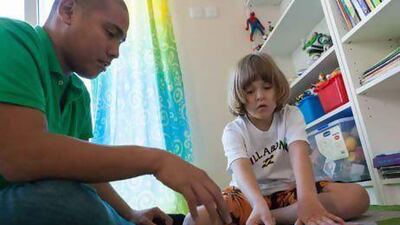Pedro Markus's face lights up as guests fill his home. For his parents, that smile is worth every dirham they invest in their son's treatment.
Pedro, 6, received a diagnosis of autism when he was 2.
"When Pedro was a small baby I had too many questions in my mind," said Nadia Lindemayer, his mother. "He wouldn't breastfeed properly and would keep moving.
"He couldn't sleep and would leave all his toys and play with unusual objects, like a small piece of wood or kitchen utensils."
Friends and family members dismissed Pedro's behaviour as normal childhood conduct and try to put his mother at ease. But when he turned 2, the signs became clearer.
"He was always very hyperactive and would not respond when we called his name," Mrs Lindemayer said. "As a mother, I knew. I had this feeling inside that something was different."
The family, in their native Brazil at the time, found it difficult to get the help they needed, said Andreas Markus, Pedro's father.
"The only one who told us 'your son is probably autistic' was the neurologist," he said. "The psychologist and speech therapist didn't know what was happening or what they were doing."
A year later Mr Markus took a job in Dubai and they immediately searched for treatment centres.
The first place they went to was the Dubai Autism Centre, but they were placed on the waiting list.
Not wanting to waste any more time, they decided on the Child Early Intervention and Medical Centre, where Pedro had about 30 hours of therapy every week.
The boy gradually moved from the intervention centre to a place that sets up a school environment adapted to the needs of developmentally disabled children, and prepares them for inclusion in a regular school.
That programme and home sessions of applied-behaviour analysis, cost about Dh24,000 a month. Mr Markus's insurance does not cover the treatments.
"They told me it is not a medical condition," he said. "But it is a medical condition. It has a direct effect on my child's life."
The family spends another Dh4,000 a month on school materials, special foods and equipment for Pedro's treatment.
The centre recommends at least 30 hours of applied-behaviour analysis a week, but financial constraints limit the boy to between 15 and 20 hours.
"If we have more, we pay more," Mrs Lindemayer said. "His happiness and potential is worth it, and we have seen him slowly progress.
"He loves the water, loves playing in the pool and he's very affectionate, which is uncommon among autistic children.
"He's always hugging us or kissing us, very loving and playful."
The cost of Pedro's treatment do not allow room for saving and his parents often have sleepless nights worrying about the future.
Insurance, community donations and the establishment of more government-funded centres are needed to help families, Mr Markus said.

